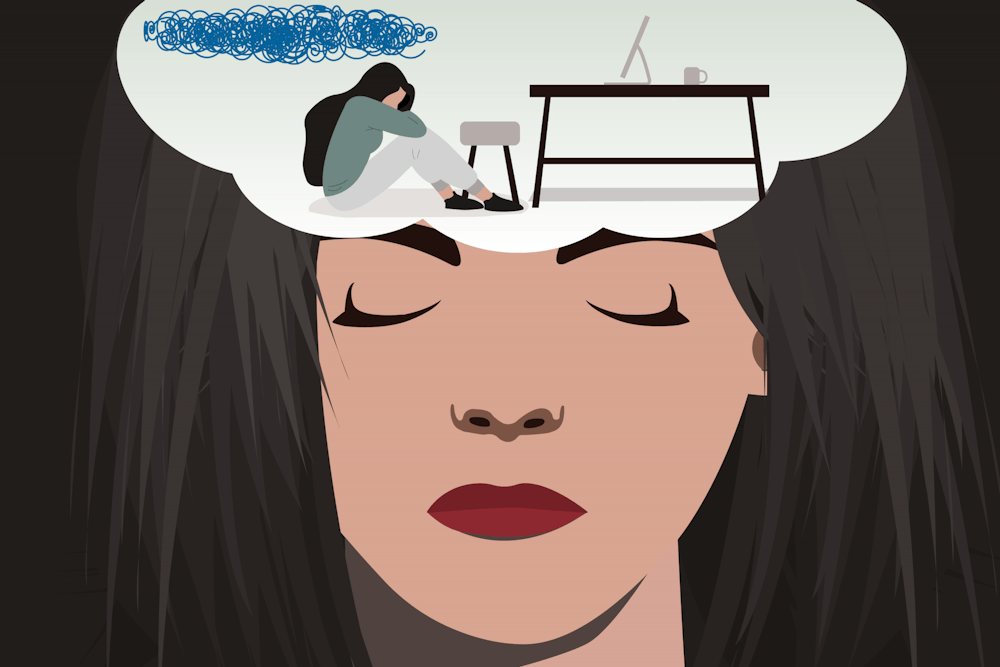Though students, faculty and staff have very different experiences with stress on campus, many have one thing in common: They feel burned out.
“I don’t think I’ve ever not been burned out,” said Nate Price, a fourth-year archeology student.
Balancing school, work and a social life can lead to students feeling overwhelmed and burned out, according to third-year finance student, Jackson Philippart.
“There’s days when you feel like you can’t do anything,” Philippart said. “It’s super difficult to be able to get out of bed and know that you have to go and do all of this stuff.”
However, through his struggles, he’s learned the importance of scheduling time for himself.
This can be especially difficult as students feel overwhelmed by work.
On top of that, the school experience isn’t normal right now, said Marco Valtorta, who has taught computer science and engineering at the university since 1988.
More of Valtora’s students are missing class than ever, and he sees the stress that puts on his graduate assistants.
“I think the students seem to be more susceptible to mental illness or mental issues that require them to ask for counseling than (they) used to be,” Valtorta said. “In part, I think this is because of the increased awareness of such issues, which is a very good thing. In part, I believe it’s because of the pandemic.”
Nevertheless, Valtorta said he remains hopeful. “Students as a whole are a resilient bunch,” he said.
USC offers mental health resources such as group and individual counseling, wellness coaching and psychiatry, according to its website. Emily Simpson, a fourth-year marketing and entrepreneurship management student, has gone to the university’s counseling and walk-in counseling sessions several times.
She said the walk-in sessions help when she’s feeling overwhelmed.
“When I just need to go cry before class, as sad as that sounds, it was really helpful because they would just breathe with me,” Simpson said.
Even though she found her time at USC counseling helpful, Simpson said she has a long-term therapist outside of school.
“When I go back to my counselor, it’s the same person and she remembers things about me, where I think when I went to the school counselor, it was different people every time,” Simpson said.
One option the university offers is group counseling.
The groups are small — only one to three people many times — which makes it easier to share personal information and experiences, said Raina Mills, a second-year anthropology student, who attended group therapy sessions throughout fall 2021.
Some students said they signed up for individual counseling sessions early in the fall and had no issues getting appointments. That was the case for Imani Butler, a first-year psychology student.
However, others gave up before getting an appointment because the waiting list was so long.
Students, like Price, the archeology major, are aware staffing shortages are straining the system.
“The students have to deal with their mental health issues, obviously, but the people doing their jobs have to deal with thousands of students — which they’re not equipped to deal with,” Price said. “That’s not a criticism of the people who are actually interacting with the students on a regular basis.”
Staff and faculty members also struggle with burnout.
USC employees have left their jobs due to burnout or fear of being around COVID-19, according to Ashley Bice, the welcome center manager and COVID-19 clearance coordinator at University Health Services.
“The more people leave, the more work gets put on the other employees. So, it’s very stressful at times,” Bice said.
Though Bice doesn’t work with the mental health side of USC’s healthcare services, she said her days at the wellness center can be 12 hours or longer. Sometimes “everybody wants to pull their hair out,” she said.
Even though burnout is widespread — more than half of respondents to a March 2021 Indeed study said they felt burned out — students have found different ways to cope.
Sometimes stopping everything and focusing on himself is what Omar Holmes, a fourth-year international business student, needs.
“If I’m at my breaking point, then I need to drop everything for a few days. Do just as little as possible and focus on eating and doing the things I enjoy,” Holmes said.
Tricking himself into being productive helps Ronan Cassano get out of bed and go about his day. If he makes himself smile, eventually it will change his mood, the second-year real estate student said.
Exercise is the outlet that allows Siyaa Rathi, a second-year pharmacy student, to focus on work again.
“Most of the time, I’m so exhausted, I don’t want to think about anything. My mind is like in a big maze,” Rathi said. “When I work out … it helps me prioritize my mind again.”

